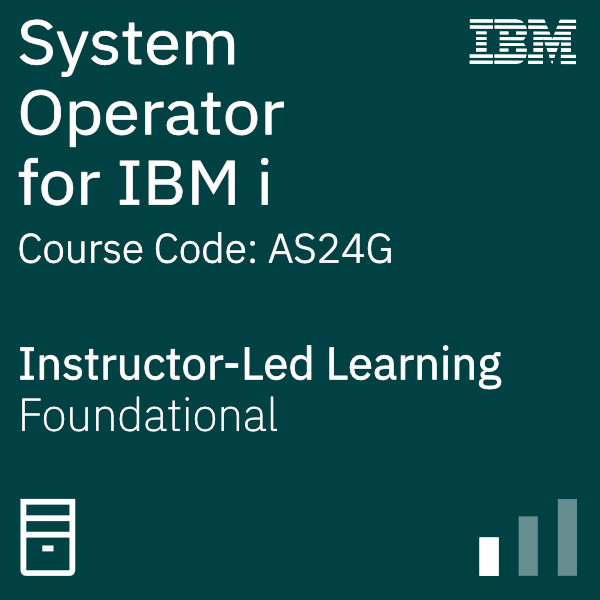

System Operator for IBM i
(AS24G)
Overview
This introductory course enables a new system operator to develop basic to intermediate level skills needed for day-to-day operations of IBM i. Focus is given to using the GUI (IBM i Access Client Solutions and IBM Navigator for i) as well as 5250 emulation sessions to perform tasks including job control, monitoring, sending messages, managing systems devices, and more. Hands-on exercises reinforce the lecture topics and prepare the student to successfully operate IBM i.
Audience
This course is designed for someone who is responsible for IBM i system operations on a daily basis.
It is not intended for technical audiences who are seeking an in-depth look at IBM i system administration. This audience should instead attend the IBM i System Administration course (OL19G).
Prerequisites
There are no prerequisites for this course.
Objective
- Use the online help and references
- Send, display, and reply to messages
- Monitor and control jobs, devices, and job and output queues
- Start and stop the system
- Create and change user profiles
- Use authorization lists and group profiles
- Manage system configuration
- Save and restore objects, libraries, and the system
- Monitor job and history logs
- Diagnose a system problem
- Order, receive, and apply PTFs
- Perform all of these functions using a 5250 emulation session as well as IBM i Access Client Solutions and IBM Navigator for i
Course Outline
- Day 1:
- Unit 1: IBM Power and IBM i concepts and overview
- Unit 2: Reference material and support
- Unit 3: Overview of IBM i Access Client Solutions
- Exercise 1: Using the keyboard and system displays
- Unit 4: Overview of 5250 emulation and help
- Exercise 2: Overview of IBM i Access Client Solutions
- Unit 5: Overview of IBM Navigator for i
- Exercise 3: Overview of IBM Navigator for i
- Unit 6: Messaging concepts
- Unit 7: Messaging with 5250 emulation
- Exercise 4: Messages with 5250 emulation
- Unit 8: Messaging with IBM Navigator for i
- Exercise 5: Messaging with IBM Navigator for i
- Unit 9: CL command concepts
- Unit 10: CL commands with 5250 emulation
- Unit 11: Concepts: Object, library, and the IFS
- Day 2:
- Unit 12: Object management with 5250 emulation
- Exercise 6: Object management with 5250 emulation
- Unit 13: Object management with IBM Navigator for i
- Exercise 7: Object management with IBM Navigator for i
- Unit 14: Introduction to work management
- Unit 15: Work management with 5250 emulation
- Exercise 8: Work management with 5250 emulation
- Exercise 9: Work management with IBM Navigator for i (Optional)
- Unit 16: Job control with 5250 emulation
- Exercise 10: Job control with 5250 emulation
- Unit 17: Job control with IBM Navigator for i
- Exercise 11: Job control with IBM Navigator for i (Optional)
- Unit 18: Print concepts
- Unit 19: Print control with 5250 emulation
- Exercise 12: Print control with 5250 emulation
- Unit 20: IBM i Access Client Solutions printer output
- Exercise 13: Print with IBM i Access Client Solutions
- Day 3:
- Unit 21: Print control with IBM Navigator for i
- Exercise 14: Print control with IBM Navigator for i (Optional)
- Exercise 15 Creating your own subsystem description
- Exercise 16 Special work management functions
- Unit 22: Starting and stopping the system
- Exercise 17: System values with 5250 emulation
- Exercise 18: System values with IBM Navigator for i (Optional)
- Unit 23: System security concepts
- Unit 24: System security with 5250 emulation
- Exercise 19: System security with 5250 emulation
- Unit 25: System security with IBM Navigator for i
- Exercise 20: System security with IBM Navigator for i (Optional)
- Unit 26: System configuration overview
- Unit 27: Configuration with 5250 emulation
- Exercise 21: Managing your system configuration
- Unit 28: Configuration with IBM Navigator for i
- Unit 29: Control language programming
- Exercise 22: Write a basic CL program
- Day 4:
- Unit 30: IBM DB2 for i introduction
- Unit 31: Save concepts
- Unit 32: Save with 5250 emulation
- Exercise 23: Save with 5250 emulation
- Unit 33: Restore concepts and overview
- Exercise 24: Restore with 5250 emulation
- Unit 34: Problem determination with 5250 emulation
- Exercise 25: Problem determination
- Unit 35: Overview of the PTF process
- Unit 36: PTFs with 5250 emulation
- Unit 37: Storage management
- Unit 38: Introduction to system tuning
- Unit 39: Class summary








